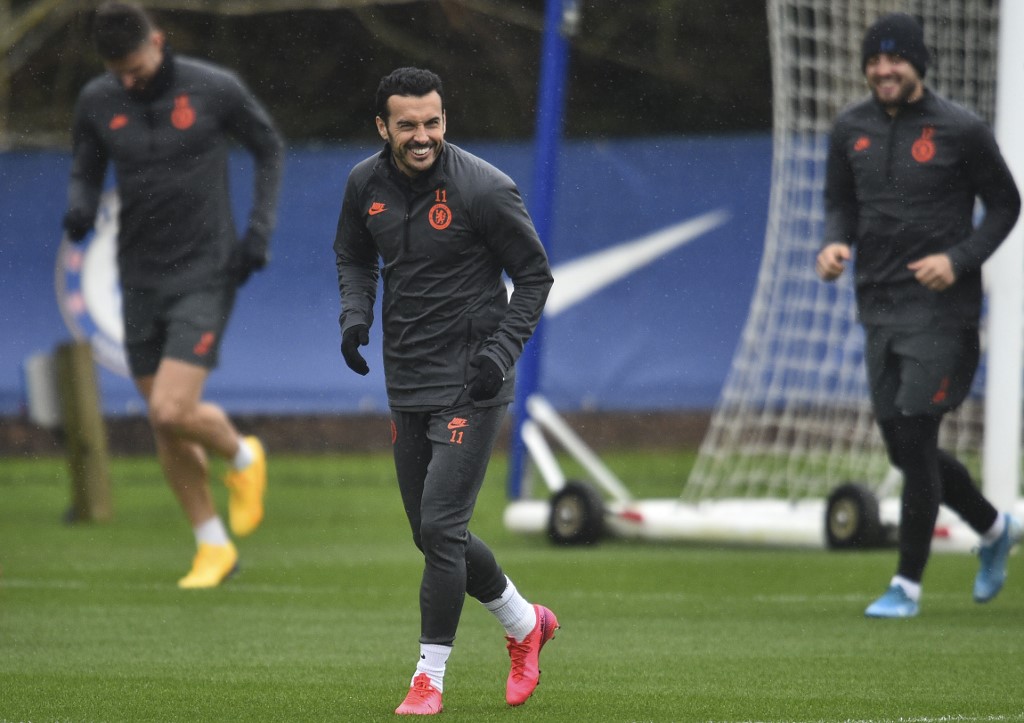
Chelsea’s Spanish midfielder Pedro attends a training session at Chelsea’s Cobham training facility in Stoke D’Abernon, southwest of London on February 24, 2020, on the eve of their UEFA Champions League round of 16 first leg football match against Bayern Munich. (Photo by Glyn KIRK / AFP)
The riches, glamour and glory of playing football in front of packed stadiums attracts the world’s top players across borders but with the European game in lockdown, many have been left isolated from their families.
Coronavirus has forced governments across Europe to impose swingeing restrictions on travel and personal freedoms.
Footballers’ daily routines have been upended with no games to play for the foreseeable future and training sessions now conducted alone at home or via video-conferencing to maintain some semblance of team spirit.
“It is a way to keep in contact with each other, to start a little bit of routine because I think that is important,” said Brighton manager Graham Potter, who has his squad doing communal morning sessions via video.
“Our guys are all here in the UK. That is why it is important for us to keep in contact and regular dialogue and make sure everyone is alright.
“They are away from families, they are missing families and that is something we understand. We sympathise with that, but we felt it was right to limit international travel and to stay at home and be safe.”
Other clubs allowed their stars to jet home. Paris Saint-Germain’s Neymar and Thiago Silva returned to Brazil and Edinson Cavani headed to Uruguay before France went into lockdown.
By contrast, Chelsea’s Spanish winger Pedro Rodriguez was stuck in London as he and the rest of the Blues squad were forced into self-isolation when teammate Callum Hudson-Odoi tested positive.
“It’s hard not to be able to see my children,” Pedro Rodriguez, whose children live in Barcelona, told Spanish radio station Cadena SER. “I imagine there are many people like me.
“I tell them to stay in the house and that I miss them.”
Birmingham boss Pep Clotet sent his family back to Spain before a state of emergency was declared in his homeland, but remained in England to do what work he could.
“I am caught between two worlds,” said Clotet. “I feel I cannot do my job properly. I keep thinking ‘Maybe I should go back?’ But I cannot go back because I am working.”
– ‘I sleep a lot’ –
For others, the greatest concern is filling time and the void left by no football.
“I am obviously a little bored since two weeks have passed since the beginning of the quarantine at home,” Juventus’ Polish goalkeeper Wojciech Szczesny told Sky Sport Italia.
“I am alone in Turin because my family went to Poland. Having said that, however, I must say that I am having a peaceful time. I sleep a lot.”
The unexpected downtime is even allowing some players accustomed to globe-trotting extra quality time with their nearest and dearest.
Sevilla midfielder Ever Banega has spent the vast majority of his playing career in Spain, but the 65-time capped Argentine international is used to hopping back and forth across the Atlantic to represent his country.
“It’s strange because there is always football on. When La Liga stops, there are international games. Even in the summer, there is football with pre-season games,” Banega told AFP.
“You miss a lot of moments with your loved ones. Now what I am mostly doing is taking advantage of the time with my kids, my wife, enjoying the family time.”
No one knows how long European football’s unprecedented stoppage will last, with leagues still hoping to complete a truncated season when it is safe to do so.
When it does, players will return with a fresh appreciation for why they travel far and wide to play the game.
“You wake up and you don’t know what to do,” said Celtic’s French defender Christopher Jullien.
“Right now it is just a different life. You realise how life is like every day without football. I miss football.”